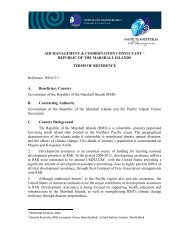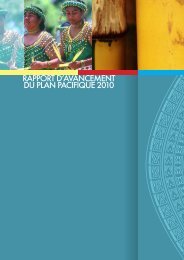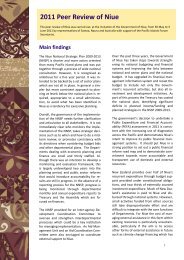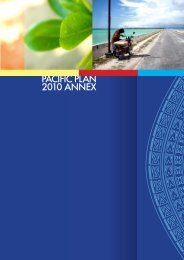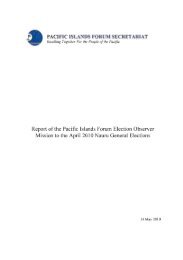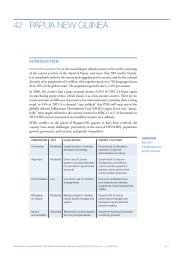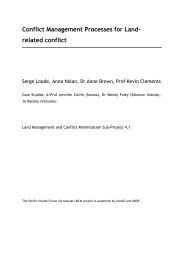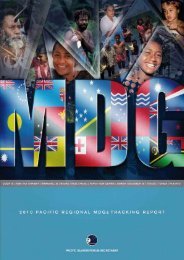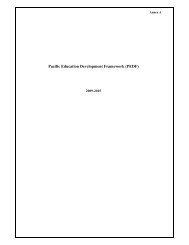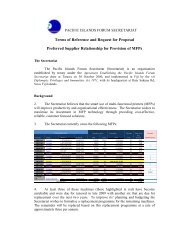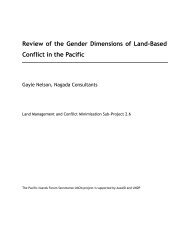Kolonia and Weno, Federated States of Micronesia CHAPTER 3 ...
Kolonia and Weno, Federated States of Micronesia CHAPTER 3 ...
Kolonia and Weno, Federated States of Micronesia CHAPTER 3 ...
You also want an ePaper? Increase the reach of your titles
YUMPU automatically turns print PDFs into web optimized ePapers that Google loves.
44<br />
U R B A N Y O U T H I N T H E P A C I F I C<br />
<strong>and</strong> training (see below sub-section for more detail), is yet to be fully realized. Support for<br />
employment in the agricultural sector through subsistence farming or other activities may<br />
be an option <strong>and</strong> a number <strong>of</strong> stakeholders throughout the consultations mentioned the<br />
possibility <strong>of</strong> growing this sector to involve more young people.<br />
Greater provision <strong>of</strong> employment opportunities for young people is imperative for keeping<br />
them occupied, building self-esteem, increasing productivity <strong>and</strong> revitalizing the economy.<br />
This was also supported by young people, in particular by young men participating in<br />
consultations.<br />
Improving the Quality <strong>and</strong> Relevance <strong>of</strong> Education<br />
Quality <strong>and</strong> relevance <strong>of</strong> education is a major issue. In 2010, poor teacher attendance rates<br />
<strong>and</strong> the low number <strong>of</strong> teachers with teaching credentials were highlighted as key problems<br />
in a Department <strong>of</strong> Education report. 65 This was illustrated by the fact that only 31 percent<br />
<strong>of</strong> grade six students met or exceeded the minimum competency st<strong>and</strong>ard. Education<br />
is one <strong>of</strong> the four sectors identified in the National Development Plan <strong>and</strong> identified for<br />
priority US Compact funding. There is great emphasis on enhancing basic education to<br />
increase indicators such as literacy rates. It is imperative that the Government prioritizes<br />
improvements to the education sector, to ensure young people are given every opportunity<br />
to become educated citizens capable <strong>of</strong> contributing to society.<br />
Noting the limited employment opportunities available in the formal sector in FSM, it is<br />
important that education opportunities are <strong>of</strong>fered which up-skill young people in areas<br />
where there are actual employment opportunities. Many young people aspire to work<br />
in nearby Guam, Hawaii or the US mainl<strong>and</strong> for the greater financial rewards <strong>and</strong> more<br />
opportunities. The education system is currently too orientated towards salaried pr<strong>of</strong>essional<br />
work, despite the very limited number <strong>of</strong> job openings <strong>and</strong> the insufficient number <strong>of</strong> skilled<br />
trades people such as electricians <strong>and</strong> plumbers. Civil society stakeholders reported that<br />
migrant workers are brought in from abroad to work in the construction industry due to<br />
a lack <strong>of</strong> local skilled workers. The limited facilities to learn vocational skills was a source<br />
<strong>of</strong> frustration expressed by a number <strong>of</strong> young men <strong>and</strong> women. Government <strong>of</strong>ficials<br />
acknowledged the need for greater preparation <strong>of</strong> the workforce <strong>and</strong> admitted the lack <strong>of</strong><br />
promotion by the government <strong>of</strong> vocational trades as a valid <strong>and</strong> rewarding career path.<br />
The College <strong>of</strong> <strong>Micronesia</strong> in Pohnpei <strong>of</strong>fers TVET. A 2008 ADB report stated several<br />
recommendations for improving TVET services in FSM including improving quality,<br />
responsiveness to market needs, <strong>and</strong> flexibility in curriculum. The quality <strong>and</strong> relevance <strong>of</strong><br />
education impacts greatly on the employability <strong>of</strong> young people once they leave school both<br />
locally <strong>and</strong> abroad. Unfortunately however, there is social stigma towards technical <strong>and</strong><br />
vocational trades in FSM. During consultations, government <strong>and</strong> civil society interviewees<br />
explained that most parents want their children to pursue sales, clerical or managerial jobs<br />
within government or the private sector.<br />
<strong>Micronesia</strong> Bound, an NGO based in Pohnpei, runs limited courses combining life <strong>and</strong><br />
vocational skills, but due to insufficient funding it is under pressure. It was reported by<br />
education <strong>of</strong>ficials that previously an initiative entitled Trades, Training <strong>and</strong> Testing Program<br />
(T3) was being implemented. The T3 Program involved training around 300 young people<br />
a year in construction, electrical <strong>and</strong> mechanical trades with basic, intermediate <strong>and</strong><br />
65 National Department <strong>of</strong> Education 2010.



